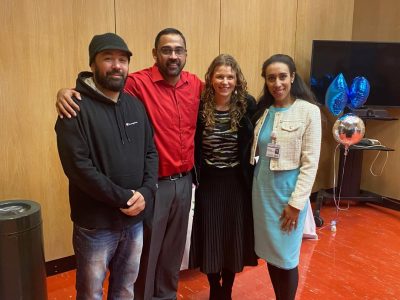Colorectal Cancer Survivors Show There is Hope After Diagnosis
News Based on facts, either observed and verified directly by the reporter, or reported and verified from knowledgeable sources.

Late in 2016, Jason Valentin was experiencing frequent gas pains in his lower stomach.
Valentin, an Ossining native who now lives in Danbury, thought it was the pressure of trying to establish his own law practice while planning a wedding with his future wife for May 2017.
“I didn’t know what it was. I didn’t think anything of it,” Valentin said. “Instead, I attributed it to stress.”
The pains and the discomfort weren’t stress, but eventually were confirmed to be Stage III colorectal cancer. At 33 years old, when Valentin thought he was just starting out on a new and exciting journey in life, now he had to work on fighting to save himself.
Valentin, along with fellow colorectal cancer survivors Stacey Gutman and Carlos Rosario, participated in a panel discussion last Thursday at Phelps Hospital that was part of a day-long Early Onset Colorectal Cancer Symposium during Colorectal Cancer Awareness Month.
Aside from all three having had colon cancer, what they had in common was the young age at which they were diagnosed, something that a generation or more ago would be considered unusual. Gutman was 34 and Rosario was 42 at the time of their diagnoses.
Dr. Crystal Antoine, a medical oncologist/hematologist at Phelps and Northern Westchester hospitals, Northwell Health, said in the 1990s about one in 12 colorectal cancer patients were identified in people under age 50. By the end of the decade, that number could be as high as 30 percent, she said.
Antoine called the trend “astounding” in such a relatively short period of time. While family history is one indicator, it didn’t explain for the rise in the incidents in younger adults. Researchers have theories but haven’t nailed down why, but could include changes in environment and diet.
“Now we’re seeing more processed foods, sugar saturated beverages, which is associated with this, and the incidents of obesity has skyrocketed since the 1980s,” Antoine said.
The changes forced the U.S. Preventative Services Task Force in 2021 to lower the starting age of its guidelines to begin colonoscopies in healthy adults from 50 to 45 years old, said Dr. Peter Stein, director of advanced endoscopy at Northwell Health. That can be lowered to 40 years old if someone has a first-degree relative who has been diagnosed, he said.
Stein stressed for the public to go for colonoscopies when they are scheduled and watch for changes in bowel movements, including blood. The goal of the colonoscopy is to find polyps and eliminate them before they turn into cancer. Early detection, which is if it’s found in Stages 1 or 2, is 90 percent curable.
“Most of the cases are completely preventable,” he said.
For Gutman, even those younger ages for colonoscopies wouldn’t have helped her. In late 2012, at 34 years old and taking care of her 14-month-old child, she began noticing blood in her stool. She went to her doctor who ordered a colonoscopy, which uncovered that
Gutman said her job was getting well, but she and Valentin agreed that there was some stigma attached to being diagnosed at a young age for colorectal cancer. Cancer-free for 10 years since her chemotherapy, she understands to take on the tasks of getting better one step at a time.
“You have to focus on getting well,” Gutman said. “That was my number one job, and people want to help you, but managing people who want to help you is a full-time job.”
“My main thing is to stay with your family, focus on yourself and try to focus with what’s going on with you,” said Rosario.
Correction: In the original posting of this story Dr. Crystal Antoine was misidentified. The Examiner regrets the error.

Martin has more than 30 years experience covering local news in Westchester and Putnam counties, including a frequent focus on zoning and planning issues. He has been editor-in-chief of The Examiner since its inception in 2007. Read more from Martin’s editor-author bio here. Read Martin’s archived work here: https://www.theexaminernews.com/author/martin-wilbur2007/
